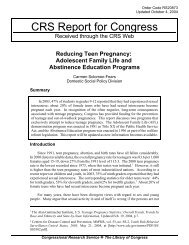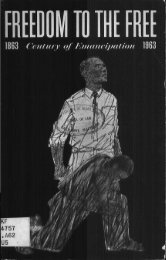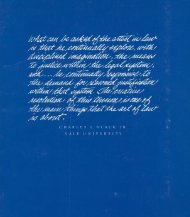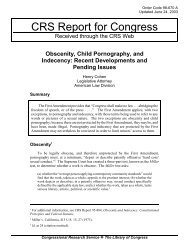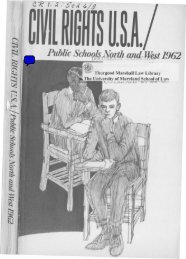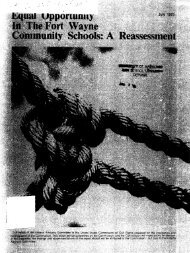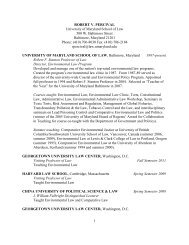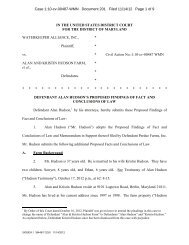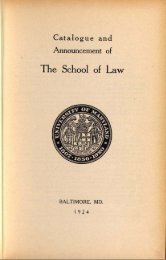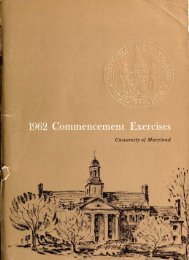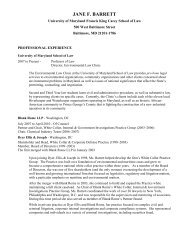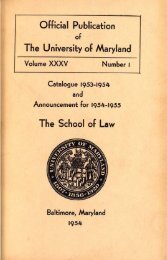journal - University of Maryland School of Law
journal - University of Maryland School of Law
journal - University of Maryland School of Law
Create successful ePaper yourself
Turn your PDF publications into a flip-book with our unique Google optimized e-Paper software.
26 MD. JOURNAL OF INTERNATIONAL LAW & TRADE [Vol. 14<br />
were valid, the Court held that the "reviewing court must first determine<br />
if [the Customs Service] regulation is consistent with the language<br />
<strong>of</strong> the statute. ' 34 "If the statute is silent or ambiguous with respect<br />
to the specific issue addressed by the regulation, the question<br />
becomes whether the agency regulation is a permissible construction <strong>of</strong><br />
the statute." 3 5<br />
A.<br />
The Court held that § 526 was ambiguous when applied to the<br />
three variations <strong>of</strong> case 2. An ambiguity is created in case 2a because<br />
the language "bearing a trademark owned by a citizen <strong>of</strong>, or by a corporation<br />
or association created or organized within . . .the United<br />
States . . . " does not make it clear which company owns the United<br />
States trademark. On one hand it could be argued that the foreign parent,<br />
which owns the American subsidiary also owns the trademark, in<br />
which case the protections provided in § 526 do not apply. On the other<br />
hand it could be argued that it is the American company which owns<br />
the trademark regardless <strong>of</strong> who owns the American company, and<br />
therefore the protections <strong>of</strong> § 526 should apply. 36<br />
The Court found a second ambiguity in the phrase "merchandise<br />
<strong>of</strong> foreign manufacture. '37 When applied to the situations involved in<br />
cases 2b and 2c, it is possible to interpret "merchandise <strong>of</strong> foreign manufacture"<br />
to mean "goods manufactured in a foreign country" '38 in<br />
which case protection would be granted. But the phrase can also be<br />
read to mean "goods manufactured by a foreign company" 3 9 in which<br />
case § 526 would apply only if the foreign subsidiary or unincorporated<br />
division were considered to be foreign, even though actually owned by<br />
an American company.<br />
The Customs Service regulations contained in subsections (1) and<br />
(2) resolve these ambiguities by removing the protection <strong>of</strong> § 526<br />
whenever the companies involved are under common control. Thus, a<br />
foreign parent in case 2a is considered to own the trademark and is not<br />
permitted to prohibit the entry <strong>of</strong> the genuine product. In cases 2b and<br />
2c similar products manufactured by companies abroad are not consid-<br />
34. Id. at 291.<br />
35. Id. (citing Chevron U.S.A., Inc. v. Natural Resources Defense Council, Inc.,<br />
467 U.S. 837, 843 (1984)).<br />
36. Id. at 292.<br />
37. Id. Only Justice White joined in this particular portion <strong>of</strong> the opinion.<br />
38. Id.<br />
39. Id.



